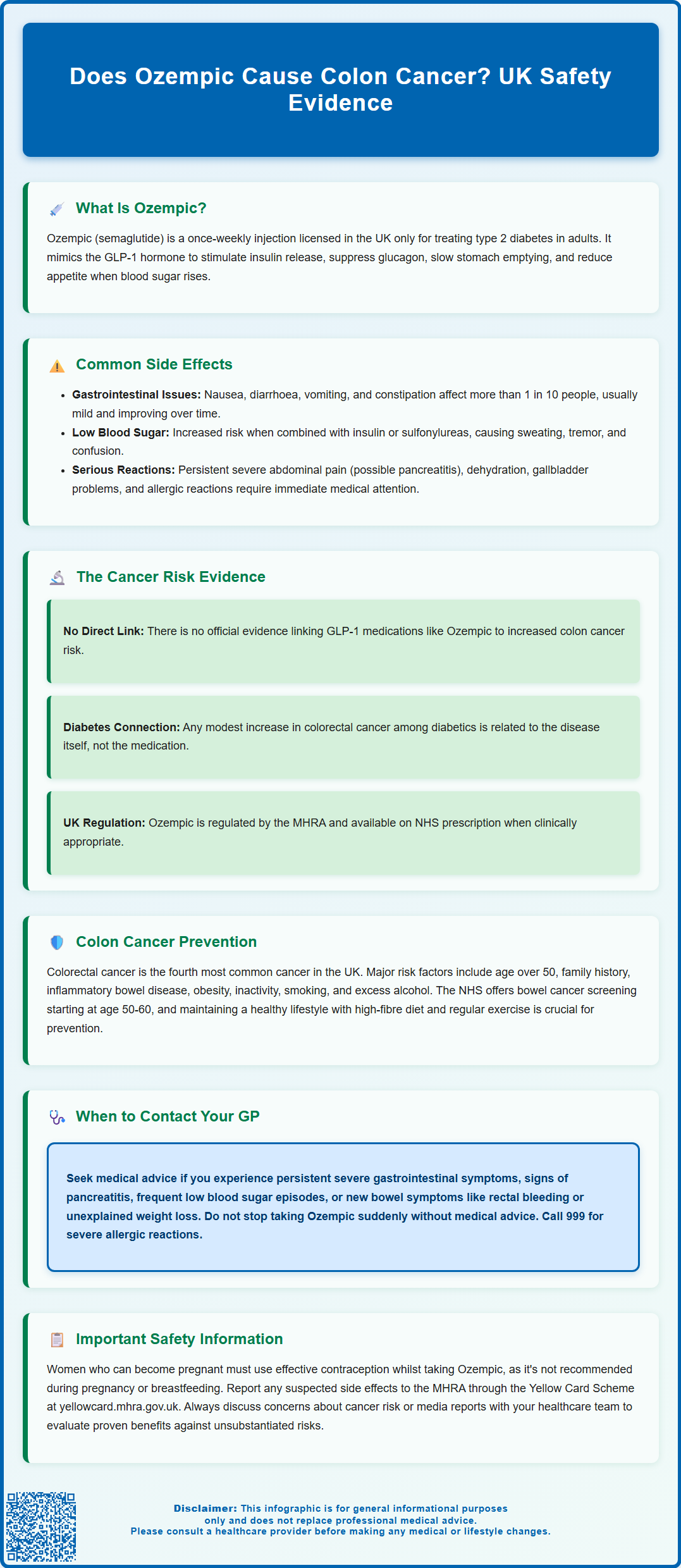Ozempic (semaglutide) is a GLP-1 receptor agonist licensed in the UK for treating type 2 diabetes mellitus in adults. As with any medication, patients may have concerns about potential side effects, including cancer risk. This article examines whether there is evidence linking Ozempic to colon cancer, reviews the established safety profile of semaglutide, and explains when to seek medical advice. Understanding the facts helps patients make informed decisions about their diabetes treatment under NHS care.
Summary: There is no established causal link between Ozempic (semaglutide) and colon cancer according to MHRA regulatory data, EMA assessments, or large-scale clinical trials.
- Ozempic is a GLP-1 receptor agonist licensed in the UK for type 2 diabetes mellitus, not weight management.
- The most common side effects are gastrointestinal (nausea, diarrhoea, constipation), typically mild to moderate and improving over time.
- Serious but rare adverse effects include pancreatitis, gallbladder disease, and diabetic retinopathy complications requiring monitoring.
- Type 2 diabetes itself is associated with modestly increased colorectal cancer risk, independent of medication use.
- Patients should report persistent bowel changes, rectal bleeding, or unexplained weight loss to their GP for investigation in line with NICE guidance.
- The MHRA continuously monitors semaglutide safety through the Yellow Card Scheme and pharmacovigilance systems.
Table of Contents
What Is Ozempic and How Does It Work?
Ozempic (semaglutide) is a prescription medicine licensed in the UK for the treatment of type 2 diabetes mellitus in adults. It belongs to a class of drugs known as glucagon-like peptide-1 (GLP-1) receptor agonists. Ozempic is administered as a once-weekly subcutaneous injection and is typically prescribed when diet and exercise alone are insufficient, as monotherapy when metformin is not tolerated or contraindicated, or as an add-on to other diabetes medications.
Importantly, Ozempic is not licensed for weight management (a different semaglutide product, Wegovy, is specifically licensed for this purpose). It is also not indicated for type 1 diabetes or diabetic ketoacidosis.
The mechanism of action of semaglutide involves mimicking the effects of the naturally occurring hormone GLP-1. When blood glucose levels rise after eating, Ozempic:
-
Stimulates insulin secretion from pancreatic beta cells in a glucose-dependent manner
-
Suppresses glucagon release, reducing hepatic glucose production
-
Slows gastric emptying, which helps moderate post-meal blood sugar spikes
-
Reduces appetite via central nervous system pathways
This multi-faceted approach makes Ozempic effective in improving glycaemic control (as measured by HbA1c levels). Weight reduction may occur as a secondary effect, which can be beneficial for many people with type 2 diabetes.
Ozempic is regulated by the Medicines and Healthcare products Regulatory Agency (MHRA) in the UK and has been evaluated by the European Medicines Agency (EMA). It is available on NHS prescription when clinically appropriate, and NICE guidance (NG28) supports its use in specific patient groups as part of a comprehensive diabetes management plan. Patients should always use Ozempic under the supervision of a healthcare professional, who will monitor treatment response and adjust therapy as needed.
Ozempic is not recommended during pregnancy or breastfeeding. Women of childbearing potential should use effective contraception when taking semaglutide and discuss preconception planning with their healthcare provider.
Known Side Effects and Safety Profile of Ozempic
Like all medicines, Ozempic can cause side effects, although not everyone will experience them. The most commonly reported adverse effects are gastrointestinal in nature and tend to be mild to moderate, often improving as the body adjusts to treatment. These include:
-
Nausea (very common, affecting more than 1 in 10 people)
-
Diarrhoea and vomiting
-
Constipation
-
Abdominal pain or discomfort
-
Reduced appetite
To minimise gastrointestinal side effects, Ozempic is initiated at a low dose (0.25 mg once weekly for 4 weeks), then typically increased to 0.5 mg weekly. If additional glycaemic control is needed after at least 4 weeks, the dose may be increased to 1 mg or 2 mg weekly, as clinically indicated.
Other important side effects include:
-
Gallbladder disease: Cholelithiasis (gallstones) and cholecystitis have been reported. Seek medical advice if you experience upper abdominal pain, fever, or yellowing of the skin or eyes.
-
Dehydration and acute kidney injury: Severe gastrointestinal side effects may lead to dehydration. Maintain adequate fluid intake and seek medical help if unable to keep fluids down.
-
Increased heart rate: Some patients may experience tachycardia (rapid heart rate).
Serious but rare side effects require immediate medical attention. These include:
-
Pancreatitis: Persistent, severe abdominal pain radiating to the back, often accompanied by nausea and vomiting, may indicate acute pancreatitis. Patients should stop Ozempic and seek urgent medical advice if this occurs.
-
Hypoglycaemia: When used alongside insulin or sulfonylureas, there is an increased risk of low blood sugar. Symptoms include sweating, tremor, confusion, and palpitations.
-
Diabetic retinopathy complications: Rapid improvement in blood glucose control may temporarily worsen diabetic eye disease, particularly in patients with pre-existing retinopathy. Regular eye examinations are recommended, especially during dose escalation.
-
Allergic reactions: Though uncommon, symptoms such as rash, swelling, or difficulty breathing warrant immediate medical assessment. Severe allergic reactions require emergency care (call 999 or attend A&E).
The MHRA continuously monitors the safety of semaglutide through pharmacovigilance systems, including the Yellow Card Scheme. Patients and healthcare professionals are encouraged to report any suspected side effects via yellowcard.mhra.gov.uk or the Yellow Card app. To date, there is no established causal link between Ozempic and colon cancer in regulatory safety data or large-scale clinical trials.
Ozempic is not recommended during pregnancy or breastfeeding. Women should use effective contraception while taking semaglutide and discuss with their doctor if planning pregnancy.

Colon Cancer Risk Factors and Prevention in the UK
Colorectal (bowel) cancer is the fourth most common cancer in the UK, with approximately 42,900 new cases diagnosed annually. Understanding established risk factors is essential for prevention and early detection. The major risk factors for colon cancer include:
-
Age: Risk increases significantly after age 50; most cases occur in people over 60
-
Family history: Having a first-degree relative with bowel cancer, especially if diagnosed before age 50
-
Inflammatory bowel disease: Long-standing ulcerative colitis or Crohn's disease
-
Genetic syndromes: Lynch syndrome (hereditary non-polyposis colorectal cancer) and familial adenomatous polyposis (FAP)
-
Lifestyle factors: Diets high in red and processed meat, obesity, physical inactivity, smoking, and excessive alcohol consumption
-
Type 2 diabetes: People with diabetes have a modestly increased risk of colorectal cancer, independent of medication use
Prevention strategies recommended by NICE and the NHS include:
- Participating in the NHS Bowel Cancer Screening Programme:
- In England, screening is offered to adults aged 60-74, with ongoing expansion to include ages 50-59
- In Scotland and Wales, screening starts at age 50
-
In Northern Ireland, screening is offered from age 60-74
-
Maintaining a healthy body weight and engaging in regular physical activity
-
Eating a balanced diet rich in fibre, fruits, and vegetables whilst limiting red and processed meats
-
Avoiding smoking and limiting alcohol intake
-
Promptly reporting red flag symptoms to your GP, including persistent changes in bowel habit, rectal bleeding, unexplained weight loss, abdominal pain, or iron-deficiency anaemia
It is important to note that there is no official evidence linking GLP-1 receptor agonists like Ozempic to an increased risk of colon cancer. The European Medicines Agency's assessment reports and the medicine's Summary of Product Characteristics do not identify colon cancer as a safety concern. The modest increase in colorectal cancer risk associated with type 2 diabetes itself should not be confused with medication effects.
According to NICE guidance (NG12 and DG30), GPs may use faecal immunochemical testing (FIT) to help assess patients with lower-risk bowel symptoms. An urgent suspected cancer referral is typically considered when FIT results are ≥10 µg Hb/g faeces or when high-risk features are present.
When to Speak to Your GP About Ozempic Concerns
Open communication with your GP or diabetes specialist nurse is essential when taking Ozempic or any long-term medication. You should contact your healthcare provider if you experience:
-
Persistent or severe gastrointestinal symptoms that do not improve after the initial adjustment period, particularly if they interfere with nutrition or hydration
-
Signs of pancreatitis: Severe, unrelenting abdominal pain, especially if radiating to the back, accompanied by nausea or vomiting
-
Gallbladder problems: Upper right abdominal pain, fever, or yellowing of the skin or eyes
-
Symptoms of hypoglycaemia: Frequent episodes of low blood sugar, particularly if you are also taking insulin or sulfonylureas
-
New or worsening bowel symptoms: Persistent changes in bowel habit, rectal bleeding, unexplained weight loss, abdominal pain, or iron-deficiency anaemia—these warrant investigation regardless of medication use
-
Concerns about cancer risk: If you have a strong family history of colorectal cancer or other risk factors, discuss personalised screening and prevention strategies
Your GP can:
-
Review your medication regimen and adjust doses or consider alternative treatments if side effects are problematic
-
Arrange appropriate investigations, such as blood tests, faecal immunochemical testing (FIT), or referral for colonoscopy if red flag symptoms are present (in line with NICE guidance NG12 and DG30)
-
Provide evidence-based reassurance about medication safety, drawing on MHRA guidance and clinical trial data
-
Coordinate care with diabetes specialist teams and gastroenterology services when needed
-
Discuss contraception and pregnancy planning if relevant, as semaglutide is not recommended during pregnancy or breastfeeding
Do not stop taking Ozempic abruptly without medical advice, as this may lead to deterioration in blood glucose control. If you have read concerning information online or in the media about Ozempic and cancer risk, bring these concerns to your appointment. Your healthcare team can help you weigh the proven benefits of improved diabetes control—including potential cardiovascular benefits—against theoretical or unsubstantiated risks.
If you experience a severe allergic reaction (difficulty breathing, severe rash, swelling), seek emergency medical attention immediately by calling 999 or attending A&E.
If you suspect you have experienced a side effect from Ozempic, you can report this directly to the MHRA through the Yellow Card Scheme at yellowcard.mhra.gov.uk or via the Yellow Card app.
Frequently Asked Questions
Is there evidence that Ozempic increases colon cancer risk?
No, there is no established causal link between Ozempic and colon cancer in MHRA regulatory data, EMA assessments, or large-scale clinical trials. Colon cancer is not identified as a safety concern in the medicine's Summary of Product Characteristics.
What are the most common side effects of Ozempic?
The most common side effects are gastrointestinal, including nausea (affecting more than 1 in 10 people), diarrhoea, vomiting, constipation, and abdominal discomfort. These are typically mild to moderate and often improve as the body adjusts to treatment.
When should I contact my GP about bowel symptoms whilst taking Ozempic?
Contact your GP if you experience persistent changes in bowel habit, rectal bleeding, unexplained weight loss, abdominal pain, or iron-deficiency anaemia. These red flag symptoms warrant investigation regardless of medication use, in line with NICE guidance on suspected colorectal cancer.
The health-related content published on this site is based on credible scientific sources and is periodically reviewed to ensure accuracy and relevance. Although we aim to reflect the most current medical knowledge, the material is meant for general education and awareness only.
The information on this site is not a substitute for professional medical advice. For any health concerns, please speak with a qualified medical professional. By using this information, you acknowledge responsibility for any decisions made and understand we are not liable for any consequences that may result.
Heading 1
Heading 2
Heading 3
Heading 4
Heading 5
Heading 6
Lorem ipsum dolor sit amet, consectetur adipiscing elit, sed do eiusmod tempor incididunt ut labore et dolore magna aliqua. Ut enim ad minim veniam, quis nostrud exercitation ullamco laboris nisi ut aliquip ex ea commodo consequat. Duis aute irure dolor in reprehenderit in voluptate velit esse cillum dolore eu fugiat nulla pariatur.
Block quote
Ordered list
- Item 1
- Item 2
- Item 3
Unordered list
- Item A
- Item B
- Item C
Bold text
Emphasis
Superscript
Subscript












